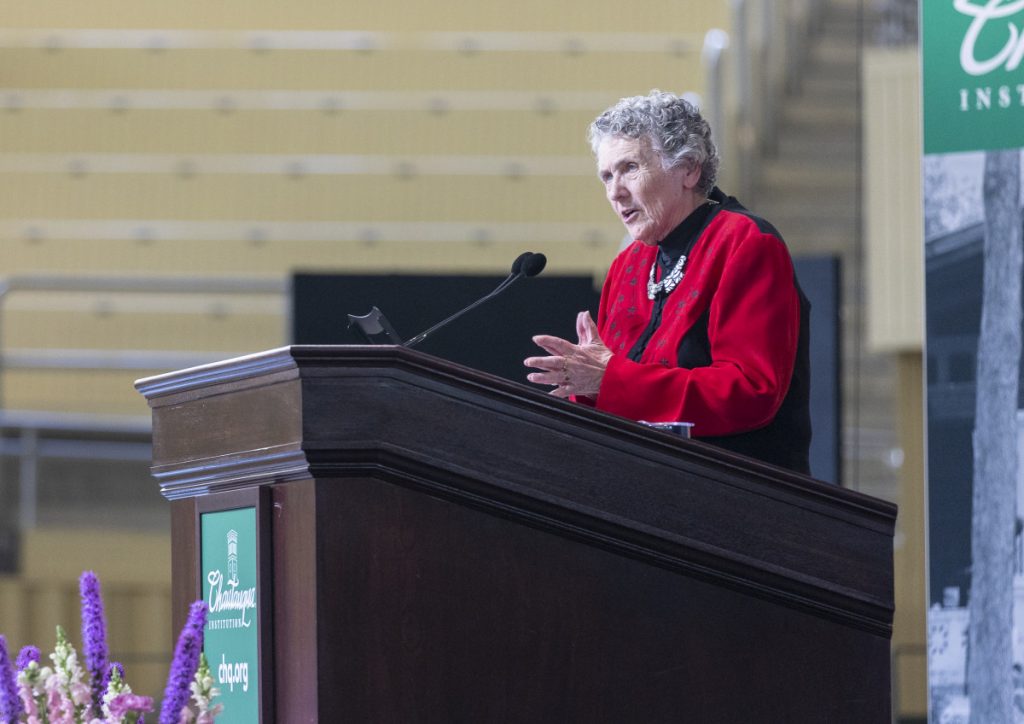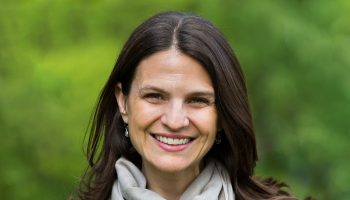MAX ZAMBRANO – STAFF WRITER

Before diving into her lecture Monday, Aug. 9 in the Amphitheater, Sr. Joan Chittister told a Hindu story of a holy one who sent disciples to a tailor to have a new shirt made for him.
It would need to be ready in three weeks, and the disciples relayed that to the tailor, who said if God blessed them, then it would be ready that same week.
It wasn’t, but he said the same thing about it being ready next week, only to not have it done again. With only one week to spare, the disciples told their teacher, who told them, “Ask how long it will take to finish the shirt if he keeps God out of it?”
The tailor wanted God to do something about the shirt, Chittister said, but it’s the tailor who needed to do something.
She also cited an old proverb: “Nothing we do changes the past, but everything we do changes the future.”
Chittister then opened the first of three Interfaith Lectures for Week Seven, themed “Creating an Economy that Works for All.” Her lecture, titled “To Exist: A Society Based on Money Needs a Population Based on Heart,” focused on the relationship between what she called spiritualities of work, money and philanthropy.
These should be focused on before discussing profit, growth, development and security, she said.
Chittister is an international lecturer, award-winning author and a Benedictine Sister of Erie, Pennsylvania. She’s been returning to Chautauqua for 35 years.
She wanted to explore two questions: What is the Abrahamic theology of work on the soul, and does a spirituality of work, money or philanthropy exist — if so, does it even matter?
In one story, a rabbi explained to disciples that their ancestors created new ways of serving according to their character, and that each of us should devise a new service for others.
“We are not being asked here to do more than we can,” Chittister said. “We are simply being asked to do something in our own time that has value. We are being asked to profit the world by our existence. We’re allowed to be unique, yes, but we are not permitted to be useless.”
The story of co-creation, she said, is the unwritten autobiography of every human, and it is the story of making the world a better place.
“Life, you see, is not about traveling through,” she said. “Life is about doing something that lasts beyond us, something that will, eventually, at least, bring the world one step closer to the completion of God’s will for it.”
Work is essential to reaching this objective, she said.
“God made the world, yes, but God did not complete it,” she said. “God left that to you and me.”
The Book of Ecclesiastes, she said, makes it clear there is a time for money, profit and development. In today’s culture, however, people work for money and not for a greater good.
“Now, we teach our children to get high-paying jobs, not jobs that soothe or heal a wounded world,” she said. “People work in our world so that they can do something other than work, and as soon as possible. People work at segmented tasks now in an assembly-line world. These segments, however, have no meaning to them.”
In the United States, people do work long hours — more than in other countries — but people are not living until they stop working, Chittister said.
“So, as a society, we work primarily for the economy, not for human expression,” she said. “And, we certainly do not work to put our own mark on the world out of a sense of global responsibility.”
Society, she said, is run by people who can ignore social injustice and destroy the climate without any concern.
“Corporations we work for dump chemicals into streams, rivers, lakes and seas that are turning our water into poison, and they can do it without a quiver of sadness, let alone of conscience, but they’ll make great profits,” she said, adding it is at the cost of a future that they may kill.
Chittister highlighted a 1972 MIT study that predicted the beginning of society’s collapse by 2040 if carbon emissions were not immediately reduced by a significant margin. Big oil and gas companies spent millions of dollars to suppress and deny those findings, Chittister said.
It worked, she said, because the study was largely forgotten — few knew it in the Amp when she asked for a show of hands of those who knew.
The study’s researcher, Gaya Herrington, spent time last year going back to her 1972 study and comparing it to 2020 numbers.
“Were they accurate? No,” Chittister said. “2020 is now the date of the beginning of the collapse of the entire climate and the standards of living of our society.”
Chittister called the narrative of big companies a lie and an attack on every generation, and she said she feared no remaining honest leadership.
People might ask what their purpose in life is, then, and what are the profits of doing anything, she said.
The world now needs a sense of economic conscience, she said, referring to the spiritualities of work, money and philanthropies.
“Good work is really what connects us to the rest of the world,” she said.
But, the notion of individuals having whatever they can get turns greed into virtue, she said. People resent subsidized housing for people kicked out of the profit system, but don’t say much about tax exemptions for corporations.
“We forget that the God who will judge the poor on honesty will judge us on generosity,” she said. “Indeed, we export our jobs, but not our pension plans or our fair labor practices or our wage scales. In fact, we use the poor of other countries to provide labor at slave wages.”
One example she gave was Indian children working 70-hour weeks at 35 cents an hour to make toys played with by children in other countries.
“We say we’d like a better world, but we ourselves go on sustaining this one by our silence,” she said.
Previous generations worked for the good of the future, she said, while this one is leaving behind garbage in space, waterways and the halls of housing projects; feeding the rats, but not children.
Industrialization set this into motion, but computerization hastened it, she said.
“It’s robbed of us of a view of what we’re really doing in life and want to do in life,” she said. “Earlier ages never had it so bad. They at least could see their crops through from beginning to end. They lived off their own crops themselves. … They knew the effect of what they did or didn’t do.”
She then described four characteristics of a spirituality of work. First, it is creating a personal worldview.
“When we sweep the street in front of the houses in the dirtiest city in the country, we’re bringing new order to the universe,” she said.
Second, this spirituality of work puts people in touch with their creativity, to a point where making a salad for dinner becomes a work of art, she said, or planting another evergreen tree becomes a contribution to the world’s health.
Third, it allows people to put their own stamp of approval on any development.
Fourth, work touches everything around it, meaning everything one does impacts the world around them.
“A spirituality of work immerses me in the development of the human community,” she said.
Work is a lifelong process of personal sanctification that saves the world for the benefit of other people, she said.
A spirituality of work, she said, means there must be a spirituality of money.
She told the story of a man who heard tiptoes behind him, realizing he was being stalked in his home. He confronted the robber and gave him a pure gold bowl, so that way he wouldn’t be woken in the middle of the night.
The robber was back the next day, and he was told there was nothing left to receive. The robber wanted to know, though, how one could give away the gold bowl at all.
“That’s the kind of giving that explains the difference between charity and philanthropy,” Chittister said.
Philanthropy is one’s personal ability to create something for a better tomorrow, even if that person is not around to see it, she said.
“The philanthropist is the giver, at any and every economic level, that sees what others do not see and believes in it enough to take a chance on it for all our sakes,” she said.
It is built on four characteristics, she said. One includes the vision for success without the promise of personal profit. Another, she noted, is that philanthropy requires solutions that have never been considered to certain problems.
The vision of philanthropy demands an awareness of what needs to be done, too, she said, highlighting free arts programs for children put in one of the most drug-ridden, harsh areas of Erie.
Philanthropy can even be reckless, she said.
“We hear it at every cocktail party,” she said. “ ‘Who would put money into that program?’ ”
Philanthropists aren’t the people who question such programs, but push for them, she said.
“Giving before other people even realize that there is something worth doing out there that is not being done is what distinguishes philanthropic vision from donations,” she said.
Scripture claims without vision, people die, Chittister said. Life is about the theology of co-creation and finishing what God began.
“You are the visionaries,” she said to the audience. “You are the only givers that we have to come to. You are the co-creators of a world badly in need of a new co-creation.”
Without giving and growing, there won’t be room for churches, schools or neighborhoods to grow, she said.
Righteous giving can be divided into four levels, as it was by the medieval Jewish philosopher Moses Maimonides. Level one is realizing that giving is essential to keep ourselves out of selfishness, Chittister said.
Level two is giving indirectly, such as community collections. Level three is giving in a way so the recipient does not know the donor. Level four is giving enough to sustain others so that they can move away from their dependence on charity.
“Charity only concentrates on meeting the needs of the day,” Chittister said. “Philanthropy provides a vision for tomorrow.”
The message of the week, Chittister said, is to never underestimate the power of the spirituality of work, money or philanthropy. Even if one is not religious, committing to good work is a deep connection to God, she said.
Again addressing the audience, Chittister noted most attendees were older in age, but their work wasn’t done.
“You have a lot more to do,” she said. “And you get up and do it.”
She hopes that once there is a great shift toward philanthropy and meaningful work, people won’t have to sleep on the streets in the world’s richest country, and young people won’t have to go into massive debt just to get an education.
“Everything we do changes the future,” she said.




